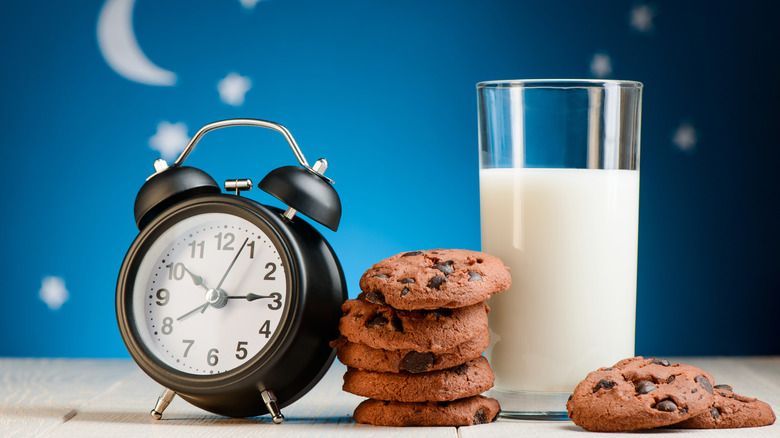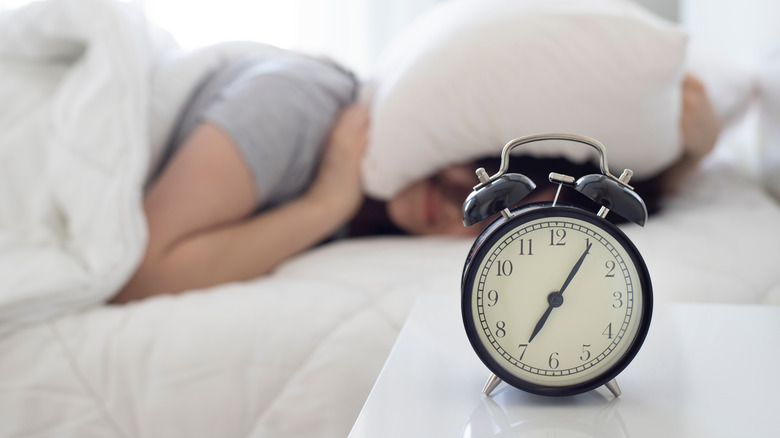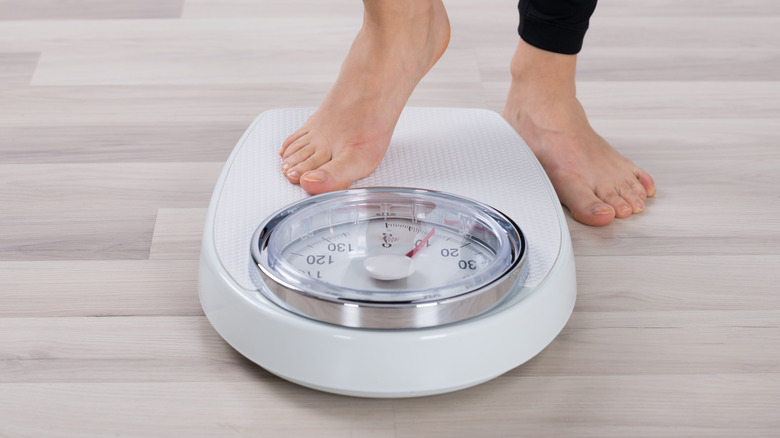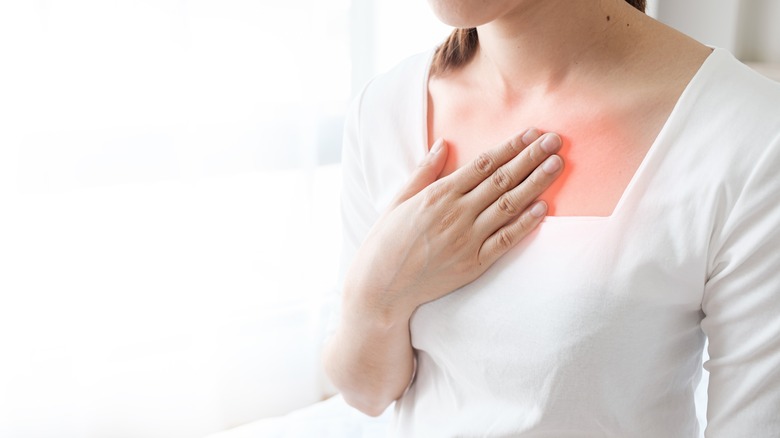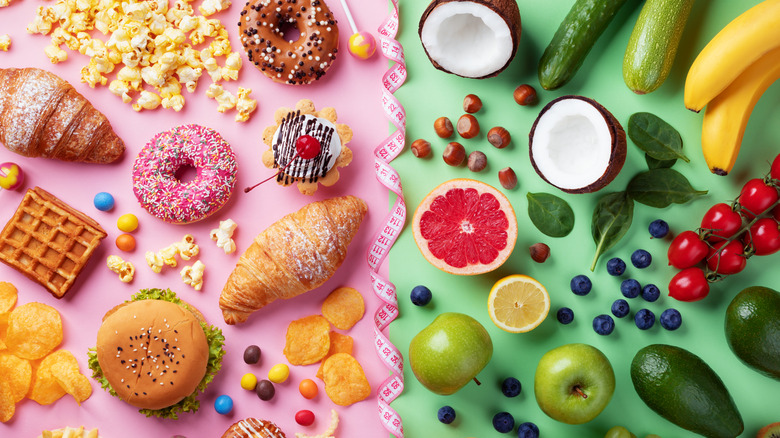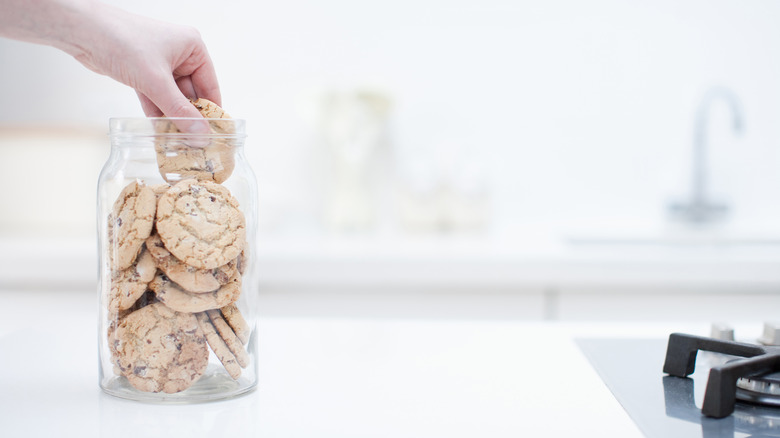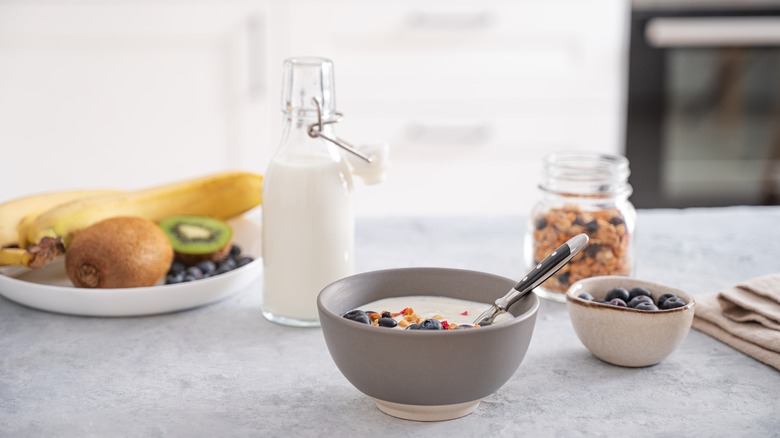7 Reasons You Shouldn't Snack Before Bed
Grabbing a quick late-night snack right before you go to bed may seem like a great idea at the time. After all, closing your eyes for the night will be near impossible with hunger pains plaguing your dreams. People eat at nighttime for a variety of reasons ranging from experiencing sweet tooth cravings to boredom. Ultimately, regardless of why you eat, you aren't alone in your desire for snacking. In 2021, a projected 71% of people actually grab a late-night bite on the regular (via Night Snacking). However delicious the sweet or savory treat you are contemplating about devouring may be, there are possible short and long-term risks associated with making that very nighttime food decision.
Snacking in general is not all that bad for most people considering each person's individual eating habits and lifestyle. But for some other folks, snacking before bed could adversely affect them, causing more grief than good. From sleepless nights to weight gain, there could be causes as to why you may want to ditch the extra meal before bedtime. As you continue reading below, you will discover if these and more variables could likely cut into the time you spend contemplating what to munch on in front of the refrigerator. Continue scrolling for the reasons why you shouldn't be snacking right before bed.
1. May leave you feeling restless
What snack you decide to grab right before you go to sleep may make you late the next day. "Any time you ingest something, you're essentially telling a part of your body that now is the time to be awake. It's kind of a wake-promoting signal," neuroscientist Dr. Andrew Varga told Today. Food consumption stimulates the body when ingested, causing a person to be awake longer than they may initially plan to be. Food is fuel the body needs all day long, just not when it should be resting. Staying up late often means a restless slumber which in turn means eating right before bed won't help to count sheep any easier.
Before reaching for the bag of chips or carton of ice cream, ask yourself how many times you are going to have to push the snooze button. Eating before trying to lay down for the night not only sends signals through your body to be "up," but it may even wake you up when you finally do fall asleep — with an impromptu bathroom break. Snacking before bed is likely to disrupt a regular sleep cycle leaving you feeling more tired the following day. The extra food can also lead to an imbalance in hormonal levels, according to the Sleep Foundation. The additional stimulation coursing through the body from the quick bite to eat disturbs the natural flow of things enough to possibly cause sleep deprivation. So before reaching for the snack, decide if staying up those extra minutes is worth your beauty sleep.
2. Possibility of weight gain while asleep
Food can keep you awake longer, as you read above, ultimately resulting in a potential impact on parts of the body unseen by the eye. Eating late can disrupt what goes on internally so much that it could impact other internal bodily operations. One internal operation likely to be influenced by late-night pantry raiding is the metabolism. The metabolic process is the bodily function of breaking down what you eat and turning it into energy (via Cleveland Clinic). However, eating food during the wrong time of day (like right before bed) could disturb this process. This irregularity to the normal energy flow will not only keep you awake longer, but how the food is broken down changes during this time, possibly contributing to weight gain. Everyone's body metabolizes food, but not everyone gets the same results.
According to a study completed by Northwestern, eating right before you shut your eyes actually alters the fat tissue throughout the body. The changes related to snacking can cause fat to be stored within the body, resulting in higher risks for obesity. Not only will fat be more likely to be kept around but it was also noted in the research that, for unknown reasons, the tested species consumed even more food during periods when they should have been asleep furthering potential weight gain. Eating late is often associated with packing on a few pounds. With this in mind, it may be worth eliminating those extra calories right before bed.
3. You may just upset your stomach
You eat throughout the entire day and never have an upset stomach; how would eating at night be any different? After choosing what to grub on, it needs time to digest in your stomach regardless of what time it is. Laying in bed before allocating enough time for your body to break the food down can cause difficulty with the entire digestive process. A snack before lying down is not the same as the one you eat while in an upright position where you are continuously active during regular daytime hours. Just how much time do you need after snacking? The answer depends on your individual bedtime.
Every person falls asleep at a different hour on the clock. To suggest a particular time to stop eating would be too specific. Rather than deprive yourself of food before bed altogether, just make sure you eat far enough in advance before you're too tired to keep your eyes open. "Our digestive system actually also slows down at night — our organs function based on the circadian rhythm," comprehensive dietician Tamar Samuels told Well and Good."If you have gas, bloating, constipation, diarrhea, or any sort of GI issues, it can be really helpful to cut off eating two to four hours before bed." In this suggested amount of time, your stomach has ample time to break down whatever you nibble on. You can test different increments of time depending upon how upset your stomach gets before bedtime.
4. Risks for acid reflux increase
Laying down while you eat a snack or right after a midnight pantry raid isn't just bad for your stomach. The combination could ruin your night. Consequently, situating your body in a lateral position with food that's not properly digested in your stomach can also cause other issues like acid reflux and heartburn to occur. According to an article in The New York Times, as many as 40% of the American population endures the agony of acid reflux. What exactly is acid reflux?
According to the Mayo Clinic, it is when what food you consume travels backward, up the esophagus, instead of down it. Symptoms of acid reflux include a burning sensation in the chest, chest pain, regurgitation, and difficulty swallowing. This uncomfortable condition is a possible ailment associated with late-night snacking, even without having high levels of acid in the stomach. The reclined position after eating a bite actually works against proper digestion. "Many of us get home late, we eat a big meal, we eat the things we're not supposed to like spicy foods or fatty foods, drink a glass of wine, a coffee, chocolate, lay down on the couch and go to bed an hour later," Dr. Tara Narula told CBS News, "These are all the things you want to try and avoid." If you continuously find yourself suffering from symptoms related to either condition, perhaps limiting the snacking before you slumber is worth exploring in order to achieve relief.
5. Can lead to poor future food choices
While the leftover cold pizza in the refrigerator, pint of ice cream in the freezer, or slice of cake is easier to plate, it's not necessarily the best kind of food to ingest right before you have to go to bed. Snack options like these (or any in general) may not make you immediately sick or cause you to take an antacid medication for relief but the food selection can possibly develop into poor future food habits. Extra snacking at night can increase your personal liking for the type of food you typically reach for. As a result, you may start reaching more often for those cookies and cakes rather than a more nutrient-dense option (via Harvard).
You could try to curb your cravings by being aware of the food selections and altering them if necessary. "If it's an apple, a piece of sweet potato, a bit of almond butter, or something simple and clean, this doesn't lead to bad habits or weight gain — I've actually seen the opposite," holistic chef Summer Sanders told The Thirty, "However, if you are mindlessly snacking or eating a full meal like potato chips, an omelet, or something more complex, then yes, these choices can start to set your body and mind into unhealthy patterns and affect your weight and health. Research has shown that people who eat more (large dinner meals) later in the day/evening do gain more weight overall." Instead of divulging at the end of the day, perhaps wait for a better time tomorrow to enjoy the treat.
6. Doesn't get better with age
If you thought the rules for what to eat before bed change year by year as you get older, you would have guessed incorrectly. Some people may even argue the rules for snacking somehow become even more complicated as time passes. While the rules may alter for some and not for others, aging is a natural part of life for everyone. As such, with age, people's bodies are inclined to adapt and change. Consequently, adjustments in food consumption or health changes are not uncommon. As people grow wiser, it's possible late night snacking may be a contributing factor in one's eating habits.
Snacking late in the day doesn't affect every single person the exact same way at the same age. However, with older age, the risks inevitably increase. "Eating later can promote a negative profile of weight, energy, and hormone markers — such as higher glucose and insulin, which are implicated in diabetes, and cholesterol and triglycerides, which are linked with cardiovascular problems and other health conditions," Namni Goel, doctor and research associate professor, told Penn Medicine. Risk for these conditions may have you altering your snack choices as you get older. According to the Centers for Disease Control and Prevention, most Americans are diagnosed with diabetes over the age of 45. What you eat and when you eat will affect your health at different stages of life, so maybe it's time to ditch the bonus meal before bed.
7. Breakfast is the most important meal of the day
When you are filling up on late-night snacks like cookies, cakes, chips, and candy, the food choices could cause you to skip morning breakfast the following day. "Our body was not designed to digest large meals during sleep, particularly carbohydrates and sugar," Carleara Weiss, sleep instructor at Aeroflow Sleep, told Insider. The saying, "breakfast is the most important meal of the day," is relevant because this is the time of day you should be filling up on carbohydrates, more protein, and sugar. Skip the midnight snack! Eating too late may hamper the relationship between food and the circadian rhythm (your internal clock), making you not hungry when you should be and hungry when you shouldn't be. You need energy throughout the day, not while you slumber.
Snacking before bed may temporarily curb your hunger for the moment, but one should avoid excessive treats before crawling into bed every night. Eating snacks at night isn't necessarily linked to one specific outcome, as factors will typically vary from person to person. Ultimately, what you decide to eat and when you decide to eat it will be most influential to the potential consequences. Continuously eating before bed may have negative impacts on your future food choices, digestion, metabolism, and overall sleep cycle habits. So before you reach into the pantry to grab a snack and pull the covers up, consider any of these reasons as to why you shouldn't snack right before bed.
